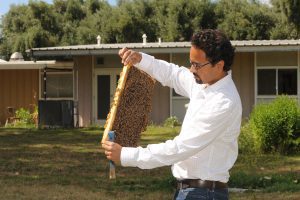The Johnson Lab at UC Davis

The UC Davis Series By: Brian R. Johnson Hello Beekeepers! This short article will introduce you to the Johnson Bee Lab at UC Davis. Our lab shares the Laidlaw Bee Lab, which is just off the Davis campus, with two other labs, that of Elina Niño and Neal Williams. Our work complements one another and together we cover quite a…
UOVBA News BotFebruary 19, 2024

